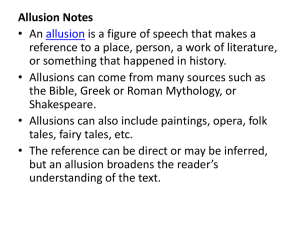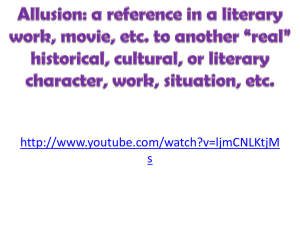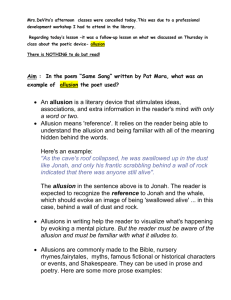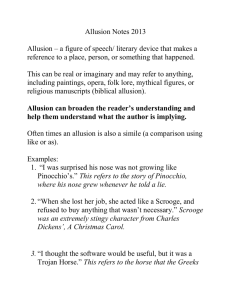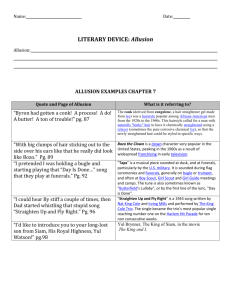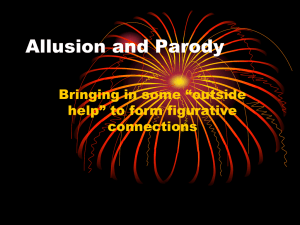Allusion: Definition, Examples, and Exercises
advertisement
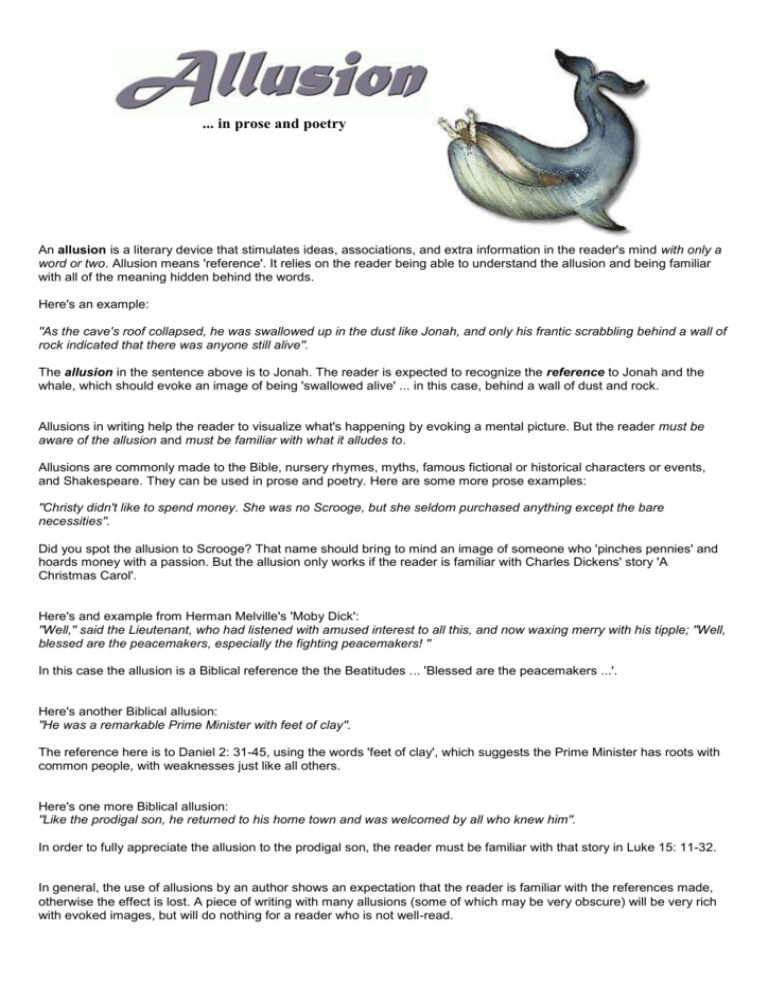
... in prose and poetry An allusion is a literary device that stimulates ideas, associations, and extra information in the reader's mind with only a word or two. Allusion means 'reference'. It relies on the reader being able to understand the allusion and being familiar with all of the meaning hidden behind the words. Here's an example: "As the cave's roof collapsed, he was swallowed up in the dust like Jonah, and only his frantic scrabbling behind a wall of rock indicated that there was anyone still alive". The allusion in the sentence above is to Jonah. The reader is expected to recognize the reference to Jonah and the whale, which should evoke an image of being 'swallowed alive' ... in this case, behind a wall of dust and rock. Allusions in writing help the reader to visualize what's happening by evoking a mental picture. But the reader must be aware of the allusion and must be familiar with what it alludes to. Allusions are commonly made to the Bible, nursery rhymes, myths, famous fictional or historical characters or events, and Shakespeare. They can be used in prose and poetry. Here are some more prose examples: "Christy didn't like to spend money. She was no Scrooge, but she seldom purchased anything except the bare necessities". Did you spot the allusion to Scrooge? That name should bring to mind an image of someone who 'pinches pennies' and hoards money with a passion. But the allusion only works if the reader is familiar with Charles Dickens' story 'A Christmas Carol'. Here's and example from Herman Melville's 'Moby Dick': "Well," said the Lieutenant, who had listened with amused interest to all this, and now waxing merry with his tipple; "Well, blessed are the peacemakers, especially the fighting peacemakers! " In this case the allusion is a Biblical reference the the Beatitudes ... 'Blessed are the peacemakers ...'. Here's another Biblical allusion: "He was a remarkable Prime Minister with feet of clay". The reference here is to Daniel 2: 31-45, using the words 'feet of clay', which suggests the Prime Minister has roots with common people, with weaknesses just like all others. Here's one more Biblical allusion: "Like the prodigal son, he returned to his home town and was welcomed by all who knew him". In order to fully appreciate the allusion to the prodigal son, the reader must be familiar with that story in Luke 15: 11-32. In general, the use of allusions by an author shows an expectation that the reader is familiar with the references made, otherwise the effect is lost. A piece of writing with many allusions (some of which may be very obscure) will be very rich with evoked images, but will do nothing for a reader who is not well-read. See if you can spot the allusions in this paragraph: "Marty's presence at the dance was definitely a 'Catch 22' situation; if he talked to Cindy she'd be mad at him, but if he ignored her there'd be hell to pay. His anger bubbled to the surface. He realized that by coming to the dance he had brought his problems with him like a Trojan Horse, and he could only hope he would be able to keep them bottled up". The first allusion is to the novel 'Catch 22' by Joseph Heller; this should suggest a situation where there is a problem with no right answer ... whatever you do will be wrong. If you have read Heller's novel, you know exactly how Marty is feeling! The second reference is to the Trojan Horse from Virgil's Aeneid, which chronicles the Greeks conquering Troy by giving a gift of a horse to their enemies and filling the belly of the horse with warriors. A vivid image ... if you recognize it. There is also a reference to 'hell', which evokes images from the Bible of something definitely unpleasant. Finally, there is a very subtle reference to 'bottling up' problems, which might suggest an image of tightly containing something, although there is no direct connection to anything. You should now have a good understanding of how allusion works. Let's see if you've really got it. Below you will find some characters and descriptions which might be referred to when writing something. Have a look: Hamlet was a character from Shakespeare who had a difficulty making a decision. Falstaff was another of Shakespeare's characters who was a large jovial man with a keen wit. The Three Stooges were a comedy team of not-too-bright buffoons. Benedict Arnold was an American traitor. Judas betrayed Jesus. Mother Teresa was a nun who selflessly devoted her life to caring for the poor and sick. Don Quixote was a fictional hero; a dreamer who was always going on quests to try to accomplish impossible tasks. Your assignment is to write a few sentences or a short paragraph (or poem) that contain an allusion to one of the characters above, or to someone or something else you choose. Enter the paragraph below and we'll post the best entries here for others to read.
